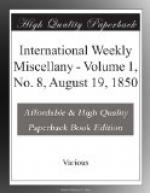A Dust-heap of this kind is often worth thousands of pounds. The present one was very large and very valuable. It was in fact a large hill, and being in the vicinity of small suburb cottages, it rose above them like a great black mountain. Thistles, groundsel, and rank grass grew in knots on small parts which had remained for a long time undisturbed; crows often alighted on its top, and seemed to put on their spectacles and become very busy and serious; flocks of sparrows often made predatory descents upon it; an old goose and gander might sometimes he seen following each other up its side, nearly midway; pigs rooted around its base,—and now and then, one bolder than the rest would venture some way up, attracted by the mixed odors of some hidden marrow-bone enveloped in a decayed cabbage-leaf—a rare event, both of these articles being unusual oversights of the Searchers below.
The principal ingredient of all these Dust-heaps is fine cinders and ashes; but as they are accumulated from the contents of all the dust-holes and bins of the vicinity, and as many more as possible, the fresh arrivals in their original state present very heterogeneous materials. We cannot better describe them than by presenting a brief sketch of the different departments of the Searchers and Sorters, who are assembled below to busy themselves upon the mass of original matters which are shot out from the carts of the dustmen.
The bits of coal, the pretty numerous results of accident and servants’ carelessness, are picked out, to be sold forthwith; the largest and best of the cinders are also selected, by another party, who sell them to laundresses, or to braziers (for whose purposes coke would do as well;) and the next sort of cinders, called the breeze, because it is left after the wind has blown the finer cinders through an upright sieve, is sold to the brick-makers.
Two other departments, called the “soft-ware” and the “hard-ware,” are very important. The former includes all vegetable and animal matters—everything that will decompose. These are selected and bagged at once, and carried off as soon as possible, to be sold as manure for plowed land, wheat, barley, &c. Under this head, also, the dead cats are comprised. They are generally the perquisites of the women searchers. Dealers come to the wharf, or dust-field, every evening; they give sixpence for a white cat, fourpence for a colored cat, and for a black one according to her quality. The “hard-ware” includes all broken pottery pans, crockery, earthenware, oyster-shells, &c., which are sold to make new roads.




